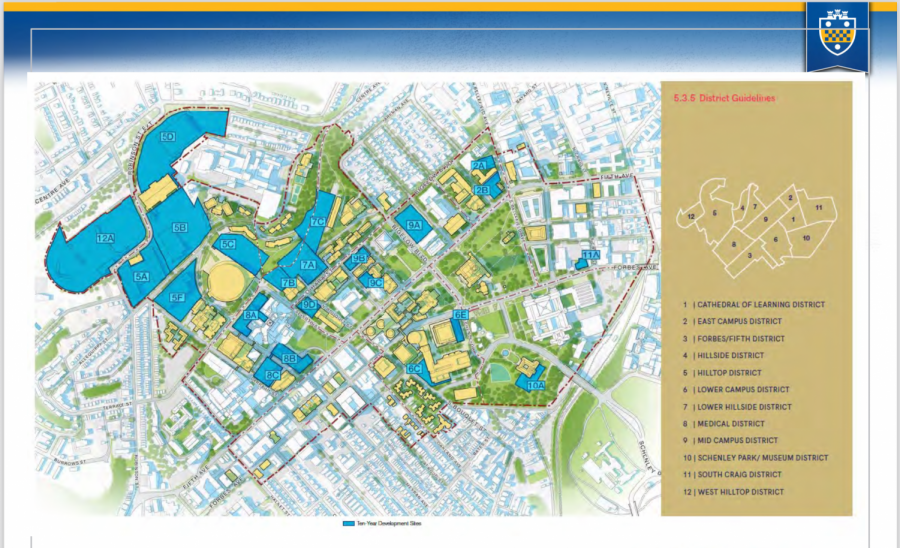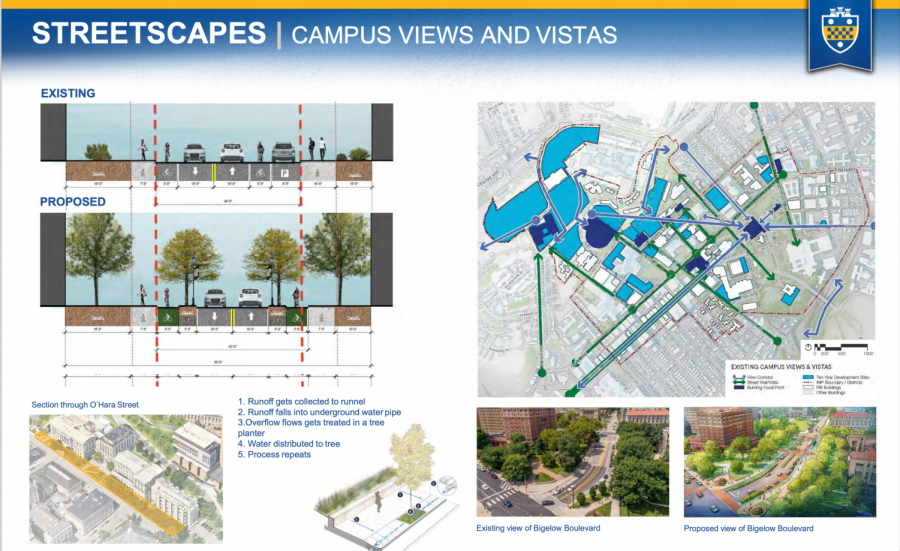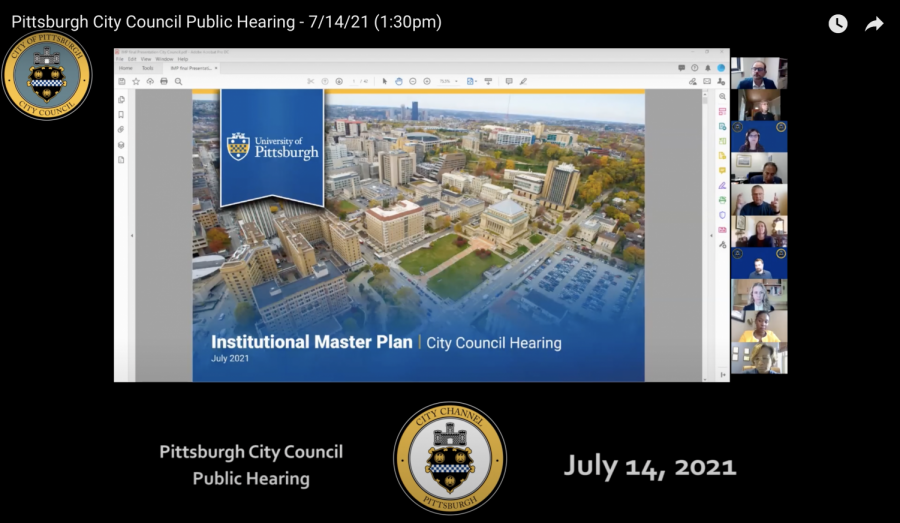Pitt officials present Institutional Master Plan to City Council
Pitt officials presented the University’s Institutional Master Plan to the City Council on Wednesday afternoon.
July 16, 2021
Pitt officials presented an application for Pitt’s new Institutional Master Plan to members of Pittsburgh City Council at a public hearing Wednesday afternoon. Pitt previously presented its master plan to the City Planning Commission in April, which sent it to the Council for approval.
Owen Cooks, assistant vice chancellor for planning, design and real estate, presented the plan before the Council. The 444-page plan includes 21 10-year development sites, historic preservation of existing buildings, environmental and sustainability goals, a campus energy plan and more. Cooks said while part of the plan may not be fulfilled within the 10-year window, there’s flexibility within the plan.
“It allows us, based on our needs and our growth, to have a couple different options within our window to develop the needs within the institution at that time,” Cooks said.

Mary Beth McGrew, associate vice chancellor for planning, design and real estate, said the IMP’s goals are to provide for flexible growth, support the student experience and identify opportunities for neighborhood advancement. She said part of the plan includes expanding student housing to accommodate an increase in enrollment over the next 10 years, including anticipating a net increase of 775 new beds — 2,400 new beds needed and 1,625 beds taken out of existing student housing.
McGrew also discussed the plan’s streetscape initiative, which includes managing stormwater, placing more trees along the streets, keeping sidewalks as wide as possible and improving bicycle lanes.
“It’s important that we accommodate the topography that is in the City and complement it and that we make it as accessible as possible,” McGrew said. “And that we have community engagement as possible.”

Paul Supowitz, vice chancellor for community and governmental relations, outlined the community engagement process Pitt when creating the IMP. Supowitz said Pitt hosted several community meetings in 2019 and used community feedback to inform the IMP.
Supowitz said Pitt staffed neighborhood association meetings, created a public website and continuously reported progress on the IMP to community members to ensure the community was actively engaged in the IMP process.
“We understood that an effort, a master plan, a document and a process of this complexity and length required a significant investment of time and effort,” Supowitz said. “And to that end, we worked to develop a mix of outreach activities and formats that would meet the stakeholders of Oakland wherever they may be.”
The hearing also allowed registered speakers to address the Council for approximately three minutes each about the plan.
Kathleen Gallagher, president of the Bellefield Area Citizens Association, said she is impressed with how detailed the master plan is and is “grateful” for Pitt’s dedication to community engagement in the process.
“I have been in the IMP process with Pitt for two years of meetings and found it to be very open, meticulous and every issue was addressed,” Gallagher said. “ Even minor community concerns were addressed at these many meetings.”
Ikhana-Hal-Makina, Grand Inca of the Iroquois Confederacy of Aboriginal American People, said the IMP does not include a plan for employees of UPMC, specifically parking for employees. While Councilperson Erika Strassburger clarified that the University is not responsible for UPMC, which is a separate institution with its own institutional master plan, Ikhana-Hal-Makina said the University also did not include Indigenous people into its master plan.
“We are the people and the rightful stewards of this land and yet we have not been reached out to, nor have we been consulted during the development that UPMC continues to do on our land,” Ikhana-Hal-Makina said.
University officials did not comment on Ikhana-Hal-Makina’s remarks during the hearing.
Roberto Cantillo, an elder and trustee at Bellefield Presbyterian Church, said while he is in favor of the master plan, the church obtained $60,000 in damages from the storm sewer plant flooding its basement and expressed concern that two new and larger buildings outlined in the plan — the redevelopment of the O’Hara Student Center and Gardner Steel Conference Center, as well as an expansion of the University Club — would add additional stress to the storm water system.
Cantillo said also the church’s power went out during a recent Sunday service due to construction happening on Thackeray Avenue. He asked the University to be more communicative with their church during future construction outlined in the IMP.
Cooks said the University goes through an extensive City review process to ensure stormwater and the sewer water system is working properly and doesn’t overflow.
“As a part of the City review process and what we go through with [the Pittsburgh Water and Sewer Authority] on new facilities, we are required to go through a pretty extensive study to ensure that taps into systems or water systems are of the appropriate size and nature to ensure that we’re not contributing to overflows,” Cooks said.
Concluding the hearing, Strassburger said she believes the IMP process was “a full and complete process” and is in favor of approving the University’s Institutional Master Plan.
“I believe that that public engagement began … in 2017,” Strassburger said. “So it was started a long time ago and there’s been meeting after meeting and, as stated by those who spoke, the University and its team has bent over backwards to accommodate requests … to really help the community understand how such a large institution … how it will impact and mesh with the existing neighborhoods of Oakland and beyond.”








